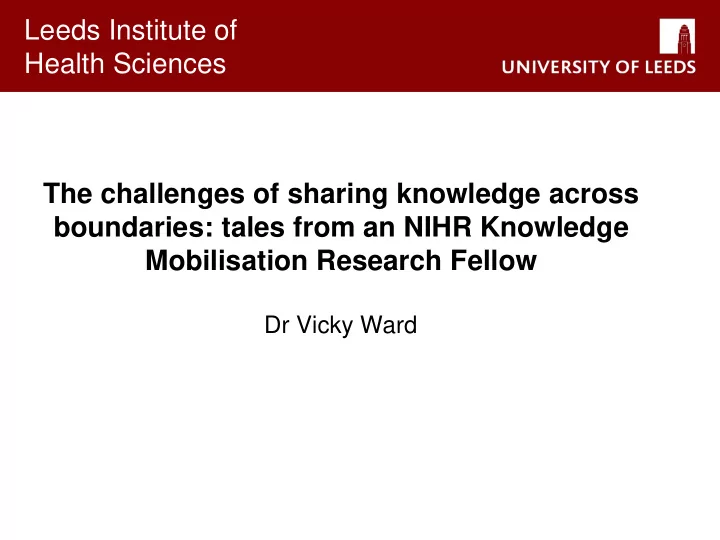

Leeds Institute of Health Sciences The challenges of sharing knowledge across boundaries: tales from an NIHR Knowledge Mobilisation Research Fellow Dr Vicky Ward
KM: a brief (and imperfect) history • 1990s Evidence based practice and policy • Early 2000s Diffusion of innovations and evidence based implementation movement • 2004 HM Treasury criticism of scholarship over impact & WHO report on knowledge for better health • 2006 Warry report says research councils must focus on impact, Cooksey identifies 1 st and 2 nd translation gap • 2007 NHS R&D strategy to focus on harnessing research to improve practices (applied health research) • 2008- present KM initiatives (CLAHRCs, AHSNs, ‘what works’ centres, NIHR KM fellows)
The rise & rise of KM research • KM literature – Ferlie, 2012 – 684 papers on KM work in the social sciences (including business and management) – Davies, 2014 - 71 substantial reviews of KM research literature (health, social care, education) • KM models – Ward, 2009 – 28 models – Mitchell, 2010 – 47 models – Tabak, 2012 – 61 models • KM terminology – McKibbon, 2010 – 100 terms
KM: three viewpoints • Direct adoption of research into policy and practice (implementation science) • A process which incorporates knowledge from research and practice (knowledge exchange) • A mechanism for producing relevant/useful research outputs informed by the needs and knowledge of users (co- production)
KM: what’s missing • Practice-based knowledge mobilisation “Information and analysis constitute only one route to social problem solving…a great deal of problem solving is accomplished through social interaction that substitutes action for thought, understanding, or analysis.” ( Lindblom & Cohen, 1979) • Tacit knowledge mobilisation “We know more than we can say” (Polanyi, 1966)
Integrated care: putting practice- based KM in context • Joined up/coordinated care – historically poor • Distressed service users, unnecessary duplication, increased financial burden • Solutions include integrated, inter-professional teams • Interprofessional working depends on sharing various ‘types’ of knowledge – Professional values and vision (resulting in shared sense of purpose, understanding each others roles, shared responsibility and decision making) – Different perspectives on service users and their needs (resulting in thorough, comprehensive and holistic assessments and care packages) – Connections and networks (resulting in relationships across agencies and sectors which can facilitate smoother care transitions)
KM fellowship project
KM fellowship project • Two questions/aspects – How does knowledge get shared across health and social care boundaries (research aspect) – How can it be improved/facilitated (practical/KM aspect)
KM challenges: early lessons and examples • Sharing perspectives on individual service users; the case of Mrs Oates • Sharing professional and cultural worldviews; the language of threat and opportunity • Doing KM research; the risks of being ‘here to help’
Leeds Institute of Health Sciences Faculty of Medicine and Health University of Leeds Charles Thackrah Building 101 Clarendon Road Leeds, United Kingdom LS2 9LJ www.leeds.ac.uk/lihs Vicky Ward is funded by a National Institute for Health Research Knowledge Mobilisation Research Fellowship. This presentation represents independent research funded by NIHR. The views expressed are those of the author and not necessarily those of the NHS, the NIHR or the Department of Health.
Recommend
More recommend